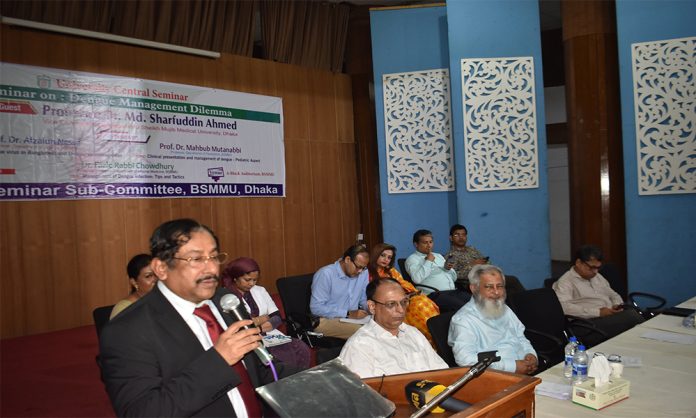
Bangabandhu Sheikh Mujib Medical University Central Seminar Sub Committee organizes seminar on dengue management dilemma at university A Block auditorium on Sunday.
Md. Sharfuddin Ahmed, Bangladesh physician and academic, vice-chancellor of Bangabandhu Sheikh Mujib Medical University (BSMMU) was present in the program as the chief guest.
“There is no work on dengue in our country throughout the year. BSMMU is the best place to do any work and research in the field of health care. Here we will do dengue research. BSMMU doctors will also work shoulder to shoulder with the Dengue Prevention Committee,” he said.
“We will take the initiative to research and prepare a dengue vaccine at BSMMU. In this regard, the Virology Department of our university has been asked to start work at the earliest,” the VC said.
BSMMU Virology department chairman, Professor Dr Afjalun Nasa, Pediatric department professor Dr. Mahbub Mutanabbi, Assistant professor Dr. Fazle Rabbi Chowdhury, also spoke on the meeting.
Internal medicine department chairman professor Dr Abul Kalam Azad spoke as a panel of expert.
BSMMU VC also said, Dengue is the mosquito-transmitted viral illness that is most prevalent globally. The disease is transmitted through the bite of a female Aedes mosquito, mostly the disease-carrying Aedes aegypti mosquito and, to a lesser extent, the Aedes albopictus mosquito.
This review study was prepared to explore the prevalence of dengue outbreaks in Bangladesh as well as to assess the difficulties and management of such outbreaks. Since 2000, dengue outbreaks have occurred practically yearly in Bangladesh, and the most severe dengue outbreak to date occurred in Bangladesh in 2019.
As dengue fever is turning into a severe health crisis across the country, it is important that you know about the disease, how it spreads, and what you should do to minimise the risk of the disease.
Dengue fever is a painful, debilitating mosquito-borne disease. Aedes aegytpi, a species of mosquito, is the carrier of any one of the four closely related dengue virus serotypes — DEN 1, DEN 2, DEN 3 and DEN 4. Symptoms appear between 3 to 14 days (on average 4 to 7 days) after the infective bite.
Symptoms of dengue fever may include high fever, severe headaches, pain behind the eyes, severe joint and muscle pain, fatigue, nausea, vomiting, skin rash (usually 2 to 5 days after the onset of fever), and mild bleeding (such a nose bleed, bleeding gums, or easy bruising).
Platelets in our blood influence the coagulation process and are responsible for preventing bleeding.
For this reason, it is recommended that you keep them within the advisable parameters. If the platelet count is significantly low due to dengue fever, one must consult a specialist doctor as early as possible and follow his instructions.
“The NS1 test should be taken on the very first day of the fever striking. It holds relevance after 24 hours also, but ideally should be taken within 24 hours,” he said.
Fluids should include not only water but also certain electrolyte solutions such as fruit juice, papaya juice, green coconut water, chicken soup, yogurt, etc. Drink enough fluids to maintain a normal urine output. If the body weight is between 30 to 50 kilogrammes, take fluids double the weight in millilitres (ml) per hour, according to medicine specialist doctor’s opinion.
Do the CBC in 8-12 hours intervals as recommended by your doctor. Do not delay showing the report to your doctor (at least within 3 hours) to get medical advice.
If the platelet count has reached a low value nearing 100,000/ml, see your doctor immediately. When you see the doctor, bring all your blood investigation reports done during this fever episode. Physical rest is highly recommended.
Staying at home without exerting yourself to any stress is ideal. Consume sufficient fluids to stay hydrated and maintain the body’s electrolyte balance. Use Paracetamol (acetaminophen) only. Follow your doctor’s instructions on the dose of Use tepid sponging to bring down the fever in between the Paracetamol dosing. Soak a clean towel in moderately warm water, then squeeze the excess water away and wipe the body to reduce fever.
The symptoms may develop into serious problems including dengue hemorrhagic fever, a rare complication characterised by high fever, damage to lymph and blood vessels, bleeding from the nose and gums, enlargement of the liver, and failure of the circulatory system. Such symptoms may progress to massive bleeding, shock, and death. This is called dengue shock syndrome (DSS).
People with weakened immune systems, as well as those with a second or subsequent dengue infection, are often at greater risk for developing dengue hemorrhagic fever.







